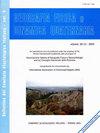Stochastic assessment of landslides and debris flows in the Jemma basin, Blue Nile, Central Ethiopia
IF 0.6
4区 地球科学
Q4 GEOGRAPHY, PHYSICAL
引用次数: 8
Abstract
In this paper we evaluate a stochastic method to assess the spatial distribution of landslide and debris flow processes in the Jemma basin, Central Ethiopia. The Jemma basin is draining the highlands (max. 3.676 m a.s.l.) northeast of Addis Ababa towards the Blue Nile. The basin is characterized by a deeply incised stratigraphy made up of volcanic deposits like flood basalts and tephra. Hence, gravitational mass movements as well as water driven erosion processes occur, documented by the respective forms. We mapped these features using Google Earth images, aerial photo interpretation and fieldwork. The information about the spatial distribution of landslide and debris flow forms was taken as dependent variable in the stochastic modelling approach. Moreover, we performed a detailed terrain analysis to derive the independent variables. We applied two different stochastic modelling approaches based on i) Boosted Regression Trees (BRT) and ii) on an Maximum Entropy Method (MEM) to predict the potential spatial distribution of landslides and debris flows in the Jemma basin. The models are statistically evaluated using the training data and a set of performance parameters such as the area under the receiver operating characteristic curve (AUC). Variable importance and response curves provide further insight into controlling factors of landslide and debris flow distribution. The study shows that both processes can be perfectly identified and distinguished. The spatial distribution of the predicted process susceptibilities generally follows topographic constraints. Model performance parameters show better results for BRT, that outperforms MEM. However, MEM results are quite robust and hence are used for the spatial prediction of process susceptibilities.埃塞俄比亚中部青尼罗州杰玛盆地滑坡和泥石流的随机评估
在本文中,我们评估了一种随机方法来评估在杰玛盆地,埃塞俄比亚中部滑坡和泥石流过程的空间分布。杰玛盆地正在使高地干涸。海拔3.676米),位于亚的斯亚贝巴东北部,朝向青尼罗河。该盆地的特点是由洪水玄武岩和火山岩等火山沉积物组成的深切口地层。因此,重力质量运动和水驱动的侵蚀过程都发生了,并以各自的形式记录下来。我们利用谷歌地球图像、航空照片解译和实地调查绘制了这些特征。在随机建模方法中,将滑坡和泥石流形态的空间分布信息作为因变量。此外,我们进行了详细的地形分析,以导出自变量。采用基于增强回归树(boosting Regression Trees, BRT)和基于最大熵法(Maximum Entropy Method, MEM)的两种随机建模方法对Jemma盆地滑坡和泥石流的潜在空间分布进行了预测。使用训练数据和一组性能参数(如接收器工作特征曲线下面积(AUC))对模型进行统计评估。变重要度和响应曲线进一步揭示了滑坡和泥石流分布的控制因素。研究表明,这两个过程都可以很好地识别和区分。预测过程磁化率的空间分布一般受地形约束。模型性能参数显示BRT的效果更好,优于MEM。然而,MEM结果是相当稳健的,因此被用于工艺敏感性的空间预测。
本文章由计算机程序翻译,如有差异,请以英文原文为准。
求助全文
约1分钟内获得全文
求助全文
来源期刊

Geografia Fisica E Dinamica Quaternaria
GEOGRAPHY, PHYSICAL-
CiteScore
1.40
自引率
0.00%
发文量
0
审稿时长
>12 weeks
期刊介绍:
It publishes original papers, short communications, news and book reviews of Physical Geography, Glaciology, Geomorphology and Quaternary Geology. The journal furthermore publishes the annual reports on italian glaciers, the official transactions of the Comitato Glaciologico Italiano and the Newsletters of the International Association of Geomorphologist.
 求助内容:
求助内容: 应助结果提醒方式:
应助结果提醒方式:


